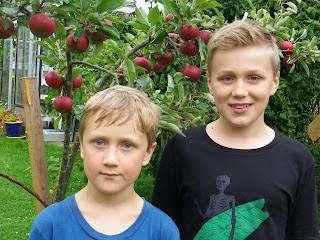I named my blog the undiscover’d country after a line from
Hamlet, visiting Helsingor (again the ‘o’ needs a diagonal line through it) was
a long time coming. The town is north of Copenhagen and across the sound is
Sweden, the castle is Kronborg, made famous by Shakespeare when it served as
Hamlet’s Elsinore.
The king used the castle but the location dictated the
primary function, which was the collection of dues from ships passing through
the sound. The castle is surrounded by canons pointed out to the water where
one can imagine the artillery convinced most captains to pay the dues no matter
how exorbitant as making a run for it would not have looked a promising option.
Before you even enter the castle you are surrounded with
sound effects that put you in a different time. As we walked up to the cannons
we heard voices and commotion that sounded as though they were preparing to
fire, and as we walked towards the tree lined gravel road leading to the castle
we heard the sound of a horse drawn procession approaching.
Kronborg is my favourite castle so far, it had once been victim
to fire and the rebuilding has left it less decorative than some. While others
have felt overwhelming with just how much there is to look at, this one kept
it simple, I need that. It also had some modern museum features that brought
the story of the castle to life.
Part of the appeal for us in this location was that it was seaside;
we started off comparing it to home because we could see the water, and we could
see Sweden, just as we can see Alaska on a clear day at home (only Sweden was
really close). We have become accustomed to being near the shore because we so often
are when we are at home on Haida Gwaii, but Denmark has been different, we live
on an island but inland. Last post I shared how someone had said that fishing
was not his culture, he meant his personal culture, Denmark has a lot of coast,
there are lots of people who fish and we saw people fishing from the shore in
Helsingor.
We enjoyed or
time in the castle but the walk around the outside was just as good, the sun on
the water, the swans in the moat, and folks out fishing. We could have been
living in the days of yore, behind us the castle, in front of us the sound, and
people out fishing for their dinner.








